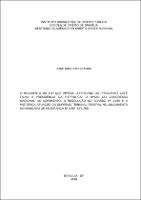Use este identificador para citar ou linkar para este item:
https://repositorio.idp.edu.br//handle/123456789/2949| Título: | O movimento militar que impediu o retorno do Presidente Café Filho à presidência da república: o apoio do Congresso Nacional ao movimento; a resolução do Senado nº 21/55 e a histórica atuação do Supremo Tribunal Federal no julgamento do mandado de segurança nº 3.557- DF/1955 |
| Autor(es): | Vianna, José Augusto Seabra Monteiro. |
| Orientador(es): | Branco, Paulo Gustavo Gonet Santiago, Marcus Firmino |
| Palavras-chave: | Autoritarismo;Militarismo;Estado de exceção;Golpe militar;Supremo Tribunal Federal |
| Data de submissão: | 2018 |
| Citação: | VIANNA, José Augusto Seabra Monteiro. O movimento militar que impediu o retorno do Presidente Café Filho à presidência da república: o apoio do Congresso Nacional ao movimento; a resolução do Senado nº 21/55 e a histórica atuação do Supremo Tribunal Federal no julgamento do mandado de segurança nº 3.557- DF/1955. 2018. 188 f. Dissertação (Mestrado em Direito Constitucional) – Instituto Brasileiro de Ensino, Desenvolvimento e Pesquisa, Brasília, 2021. |
| Resumo: | O objetivo desta dissertação é o de examinar os argumentos jurídicos utilizados
pelos Ministros do Supremo Tribunal Federal (STF) na análise, em 14 de dezembro
de 1955, do Mandado de Segurança nº 3.557-DF que teve por finalidade obter
ordem para que Café Filho reassumisse cargo de Presidente da República, do qual
fora afastado pelo Senado por meio da Resolução nº 21, de 22 de novembro de
1955. Com base neste estudo, busca-se compreender decisão tomada pelo STF
que, ao final, e ainda que não tenha havido decisão de mérito, impediu o retorno do
requerente ao cargo de Presidente da República ao suspender o julgamento do
Mandado de Segurança, colaborando, assim, de forma decisiva, para a manutenção
de Nereu Ramos no cargo de Presidente da República, e para a posse de Juscelino
Kubitschek em 31 de janeiro de 1955. Para se bem compreender estes fatos
políticos e jurídicos, a dissertação considera, preliminarmente, o pensamento
autoritário brasileiro do último quartel do século XIX (positivismo, castilhismo) e da
primeira metade do século XX, e seus principais ideólogos (Alberto Torres, Oliveira
Vianna, Azevedo Amaral, Francisco Campos). Estuda, ainda, o espírito militarista
dominante nos séculos XIX e XX no Brasil, a importância dos militares, e sua
postura autoritária, em todos os episódios deste período histórico, inclusive o de 11
de novembro de 1955. O estudo procurou entender, da mesma forma, a estrutura
partidária criada no final de 1945 que motivou, decisivamente, muitos fatos ocorridos
naquele mês de novembro de 1955, e que culminou no objeto deste trabalho, qual
seja: julgamento, pelo STF, do Mandado de Segurança nº 3.557-DF. Por fim, a
pesquisa intenta demonstrar que os acontecimentos havidos no Brasil foram
compreendidos pela maioria dos Ministros do STF, em especial Nélson Hungria, o
qual deixou claro, expressamente, que o grave momento político então vivido não
encontrava solução eficaz na Constituição em vigor, razão pela qual foi necessária
imposição de autêntico Estado de exceção “schmittiano”, o qual, sobrepondo-se por
curto espaço de tempo ao ordenamento jurídico, não somente salvou a Constituição
de provável fim, bem como todos os institutos democráticos nela previstos. |
| Abstract: | The objective of this dissertation is to examine the legal arguments used by Federal Supreme Court (Superior Tribunal Federal – STF) justices in the examination, on December 14th 1955, of Mandamus 3557 – DF. The objective of which was to obtain an order for President Café Filho to reassume the position of President of the Republic, from which he was removed through Senate Resolution 21 of November 22nd 1955. Based on this assessment it seeks to understand the decision made by the STF which in the end, and despite no decision having been made based on the merits of the case, prevented the petitioner from resuming the presidency of the Republic by suspending the adjudication of the Mandamus, thus collaborating decisively towards maintaining Nereu Ramos in the position of President of the Republic and the swearing-in of Juscelino Kubitschek on the 31st January 1955. In order to fully understand these facts, both political and legal, this dissertation carries out a preliminary examination of the authoritarian mindset in Brazil in the last quarter of the 19th Century (positivism, Castilian movement tendencies) and of the first half of the 20th Century and its main ideologists (Alberto Torres, Oliveira Vianna, Azevedo Amaral, Francisco Campos). It studies, moreover, the dominant militaristic spirit in the 19th and 20th centuries in Brazil, as well as the importance of the military and their authoritarian stance, throughout all episodes of this historic period, including that of 11th November 1955. The study goes on to examine the political party structure created at the end of 1945 which was a key motivator for the many events that took place in that month of November 1955 and culminated in the object of this study, I.E.: the judgement, by the STF, of Mandamus 3557-DF. Finally, the research endeavours to demonstrate that the events which took place in Brazil were clearly understood by the majority of the Justices of the STF, especially Nélson Hungria, who made clear, albeit not overtly, that the troubled political period at the time did not find an effective solution in the Constitution in effect, a reason that deemed the need for the imposition of authentic “schmittian” State of emergency, which by overriding for a short period of time the legal framework, saved not only the Constitution from a likely demise, but also all the democratic institutions provided under it. |
| URI: | https://repositorio.idp.edu.br//handle/123456789/2949 |
| Aparece nas coleções: | Mestrado Acadêmico em Direito Constitucional |
Arquivos associados a este item:
| Arquivo | Descrição | Tamanho | Formato | |
|---|---|---|---|---|
| DISSERTAÇÃO_JOSÉ AUGUSTO SEABRA_MESTRADO EM DIREITO 2017.pdf | 1.79 MB | Adobe PDF |  Visualizar/Abrir |
Os itens no repositório estão protegidos por copyright, com todos os direitos reservados, salvo quando é indicado o contrário.
